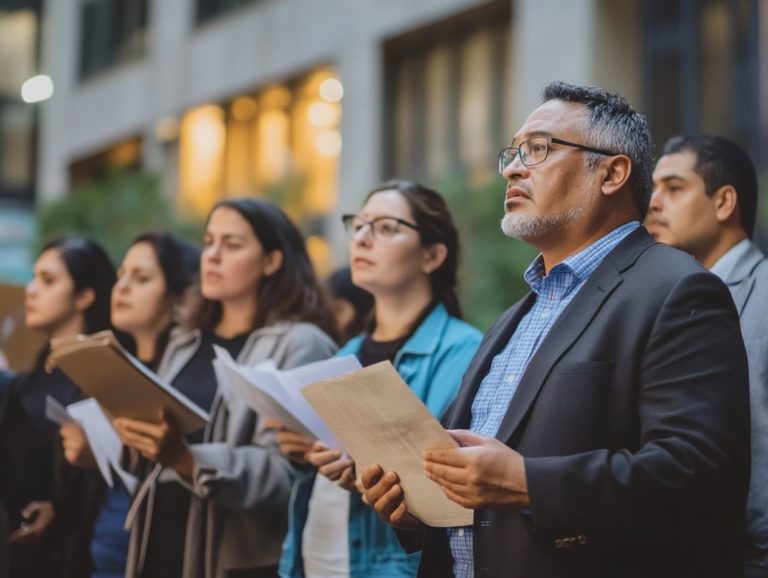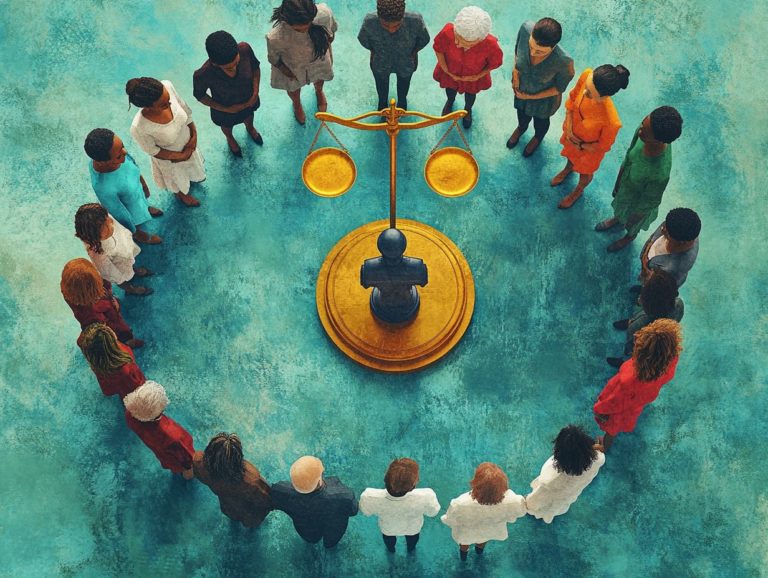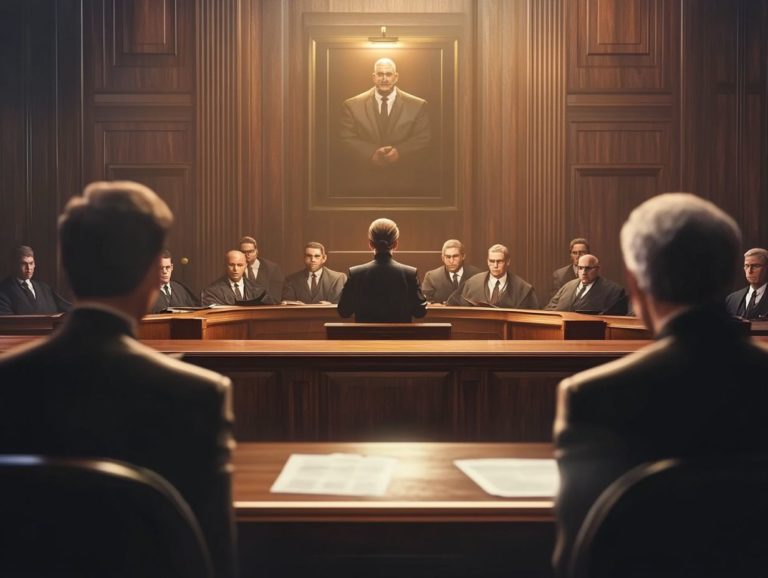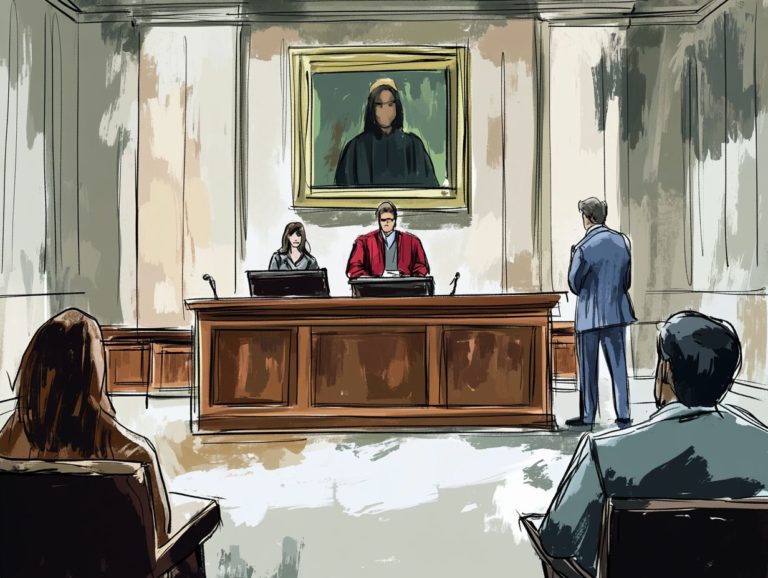The Role of Ethics in Rights of the Accused
In today s justice system, the rights of the accused are of utmost importance. This strikes a delicate balance between individual freedoms and societal safety.
Let s explore the legal protections that shield the accused, along with the ethical principles that form the foundation of these rights.
You ll encounter the dilemmas faced by legal professionals and the challenges in ensuring fair treatment. All while considering how these factors influence both the accused and the wider community.
Recent cases underscore the tangible implications of these issues. It s essential for you to understand the ongoing dialogue surrounding justice and fairness.
Contents
- Key Takeaways:
- Understanding the Rights of the Accused
- Importance of Ethics in the Justice System
- Ethical Considerations in the Rights of the Accused
- Challenges to Ethical Practices in the Rights of the Accused
- Ensuring Ethical Treatment of the Accused
- Recent Cases and Controversies
- Frequently Asked Questions
- What is the role of ethics in protecting the rights of the accused?
- How does the concept of ethics relate to the rights of the accused?
- What ethical principles are crucial in safeguarding the rights of the accused?
- How can a lack of ethics impact the rights of the accused?
- What is the role of legal professionals in upholding ethical standards in the rights of the accused?
- How Can We All Promote Ethical Practices?
Key Takeaways:
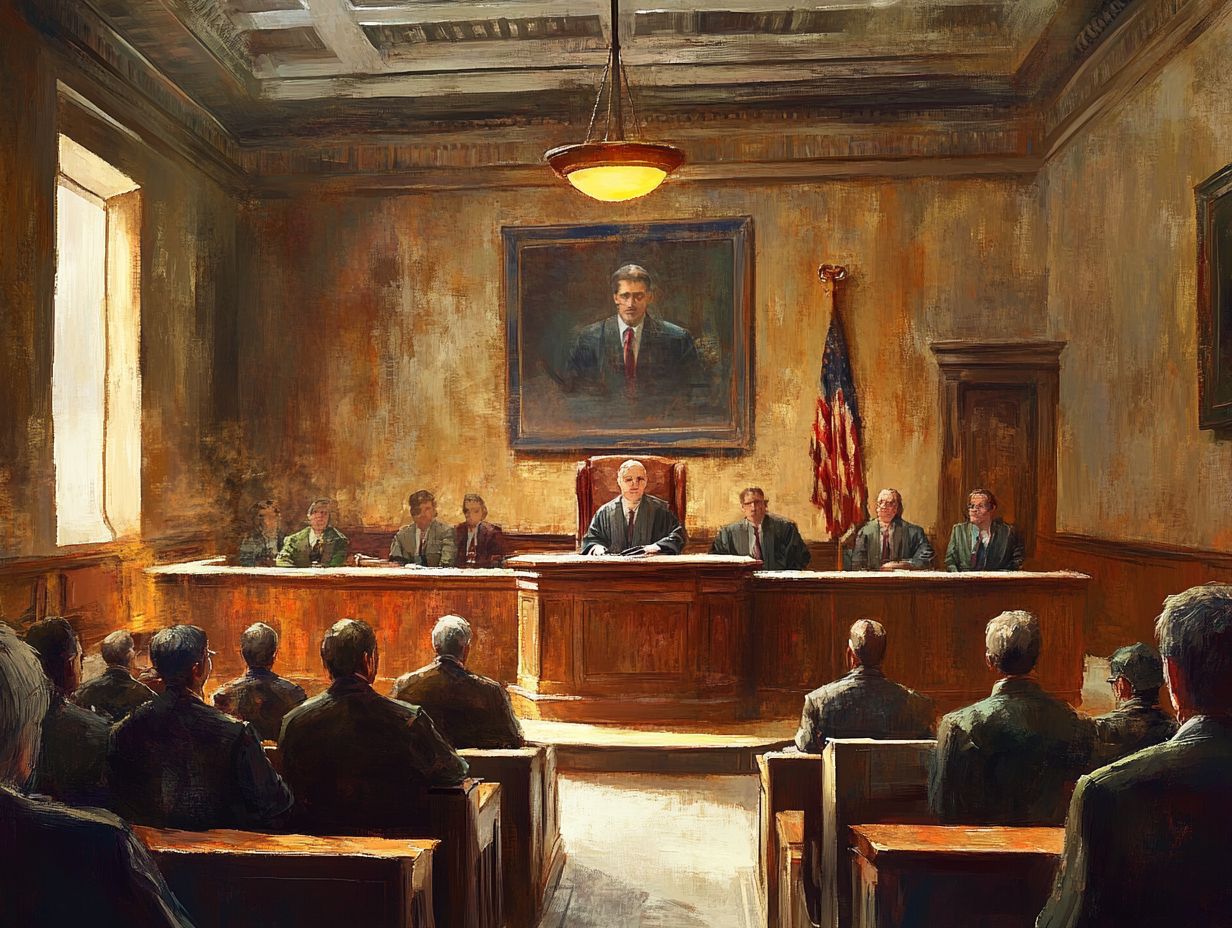
Understanding the rights of the accused is vital for a fair justice system.
Ethics are crucial for protecting these rights.
Balancing the rights of the accused and society poses ethical challenges, but it is necessary for a functional legal system.
Understanding the Rights of the Accused
Understanding the rights of the accused is essential for maintaining the integrity of the legal system. This ensures you receive fair legal representation throughout the criminal justice process.
This principle encapsulates the ethical standards designed to protect defendants and uphold due process. It reinforces the fundamental moral tenets that shape society’s view of justice and accountability.
Legal professionals, including defense attorneys and prosecutors, are instrumental in understanding these rights. They help cultivate public trust in the legal system.
Overview of Legal Protections
Legal protections for the accused are essential pillars of the criminal justice system. They prevent wrongful convictions and ensure you are treated fairly under the law.
These safeguards include vital components like due process rights. Due process means the legal requirement that the state must respect all legal rights owed to a person.
These rights guarantee that you receive a fair and impartial hearing. They ensure that anyone facing legal proceedings can contest evidence, present their case, and appeal decisions when necessary.
The existence of these protections highlights a fundamental principle of justice: you are presumed innocent until proven guilty. By upholding these rights, the legal system fosters trust within the community. This assures you that legal outcomes stem from reasoned judgments rather than arbitrary actions.
This trust is crucial to the social contract, reinforcing both accountability and the rule of law.
Importance of Ethics in the Justice System
The significance of ethics in the justice system cannot be overstated. Ethical principles serve as the foundation for accountability and public trust in both law enforcement and legal representation.
A strong ethical framework guides legal professionals in their responsibilities. It also ensures that they fulfill their moral obligations while advocating for justice.
This commitment to ethics reinforces the integrity of the entire system. It fosters trust and confidence among the public.
Ethical Principles and Their Impact on the Accused
Ethical principles play a pivotal role in shaping how you, as an accused individual, are treated within the legal system. They guide defense attorneys in their commitment to providing effective representation while upholding integrity and fairness.
Principles like client confidentiality and advocacy are essential in establishing trust between legal professionals and defendants. When attorneys protect the confidentiality of the information you share, they create a safe environment for open dialogue. This allows you to be candid without the anxiety of potential repercussions.
The duty of advocacy drives these attorneys to passionately defend your rights. They ensure that you receive a fair trial, regardless of the allegations you face. This dynamic cultivates a relationship rooted in mutual respect and reinforces the fundamental principles of justice within the legal framework.
Ethical Considerations in the Rights of the Accused
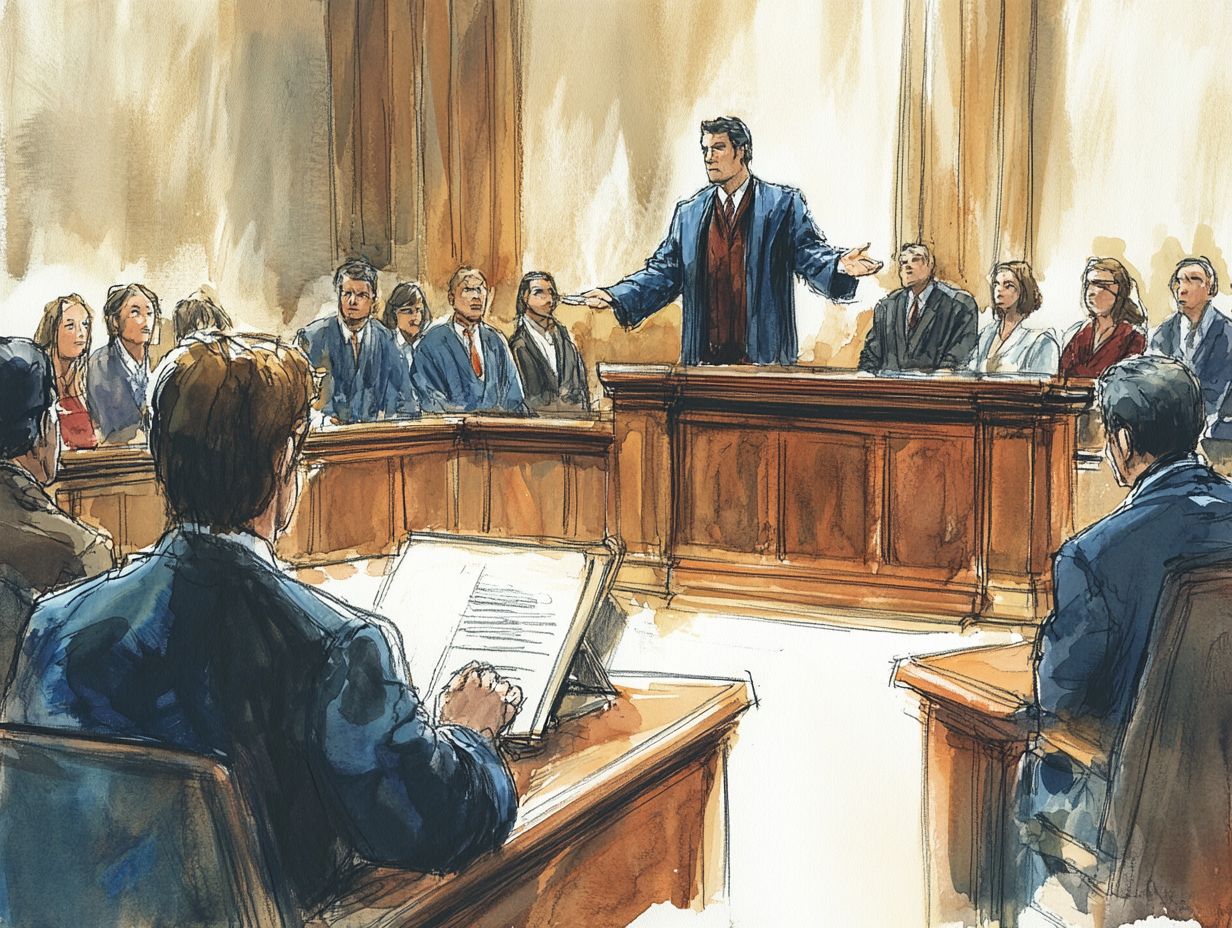
Ethical considerations hold significant weight in the rights of the accused. They shape how legal representatives and law enforcement officers approach the intricate landscape of due process in criminal cases.
Your understanding of these ethical imperatives can profoundly influence the fairness and integrity of the legal process.
Balancing the Rights of the Accused and Society
Balancing the rights of the accused with society’s needs presents ethical challenges. You must ensure justice and maintain public trust in the system.
This tension often arises in serious crime cases. Here, you defend individual rights while considering community safety.
Defending a client accused of violent acts can create a moral dilemma. Public sentiment may lean toward punishment, raising the question of accountability.
Upholding a fair trial benefits not only the defendant but also strengthens society’s trust in the judicial process.
Thoughtful decisions rooted in ethics lead to a more balanced legal framework that values individual freedoms and community safety.
Challenges to Ethical Practices in the Rights of the Accused
Ethical challenges for the rights of the accused often stem from systemic issues in the criminal justice system. These problems can lead to violations of ethical guidelines and compromise professional integrity.
Common Ethical Dilemmas and Solutions
Legal professionals frequently encounter ethical dilemmas that require careful thought. You must balance your duty to defend clients with the need to uphold the law.
For example, defense attorneys may struggle with whether to disclose evidence that proves a client’s innocence. Law enforcement officers might face challenges regarding the use of excessive force.
To navigate these situations effectively, adopt a clear ethical decision-making framework. Regular training and open discussions about ethical scenarios improve your ability to make informed choices.
By prioritizing transparency and accountability, you help build trust and enhance service within the justice system.
Ensuring Ethical Treatment of the Accused
Ensuring ethical treatment for the accused is a key responsibility for legal professionals and law enforcement. They must honor their ethical obligations to build a fair and just legal system.
Role of Legal Professionals and Law Enforcement
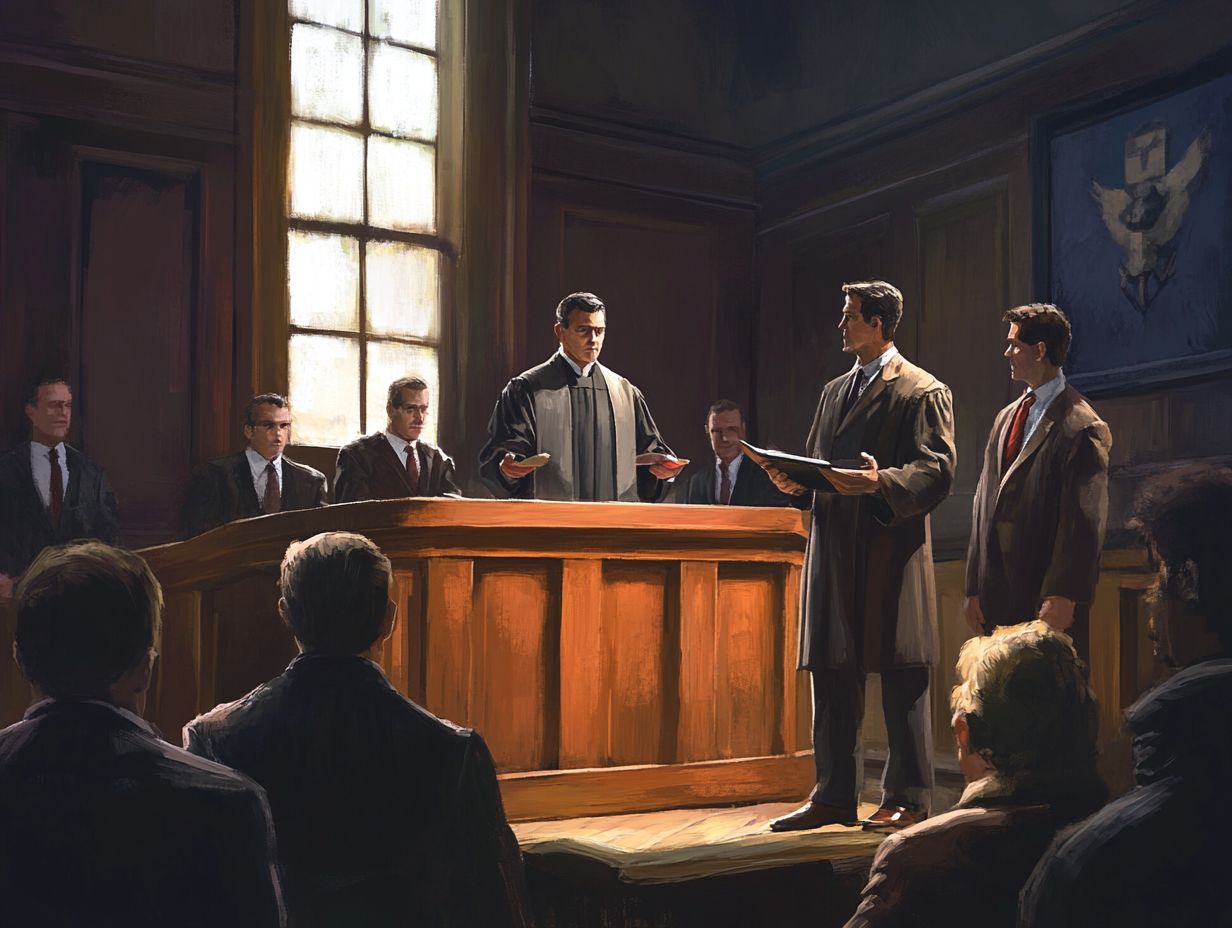
Legal professionals and law enforcement play crucial roles in maintaining integrity in the justice system. Each participant has a unique function:
- Defense attorneys advocate for the rights of the accused, ensuring fair treatment and access to strong defense.
- Prosecutors focus on delivering justice, emphasizing accountability rather than merely seeking convictions.
- Law enforcement officers gather evidence and enforce laws while respecting individual rights.
These roles collectively foster a just legal system, encouraging ethical practices that build public trust.
Recent Cases and Controversies
Recent cases highlight ongoing ethical dilemmas in the justice system, especially in high-profile situations that draw public attention. These controversies raise critical questions about accountability and fairness in the judicial process.
Impact of Ethical Issues on High Profile Cases
Ethical issues in high-profile cases can shake your trust in the legal system, especially regarding legal representation and accountability.
When legal professionals face ethical challenges, their choices can profoundly shape not only the outcomes of these cases but also the broader perception of justice among the public. In high-stakes situations, media attention is intense, and the actions of lawyers and judges are often under a microscope, creating a landscape where ethical missteps are amplified.
This scrutiny can spark questions about the integrity of the legal system, leading you to wonder whether justice is genuinely being served.
The relationship between legal ethics and public opinion is crucial; how an attorney navigates these issues can either strengthen or weaken community confidence in the rule of law.
Frequently Asked Questions
What is the role of ethics in protecting the rights of the accused?
The role of ethics in protecting the rights of the accused is to ensure that they receive fair and just treatment throughout the judicial process. Understanding the rights of the accused is essential, as ethical principles like fairness, justice, and due process are crucial in upholding their rights and maintaining a just legal system.
How does the concept of ethics relate to the rights of the accused?
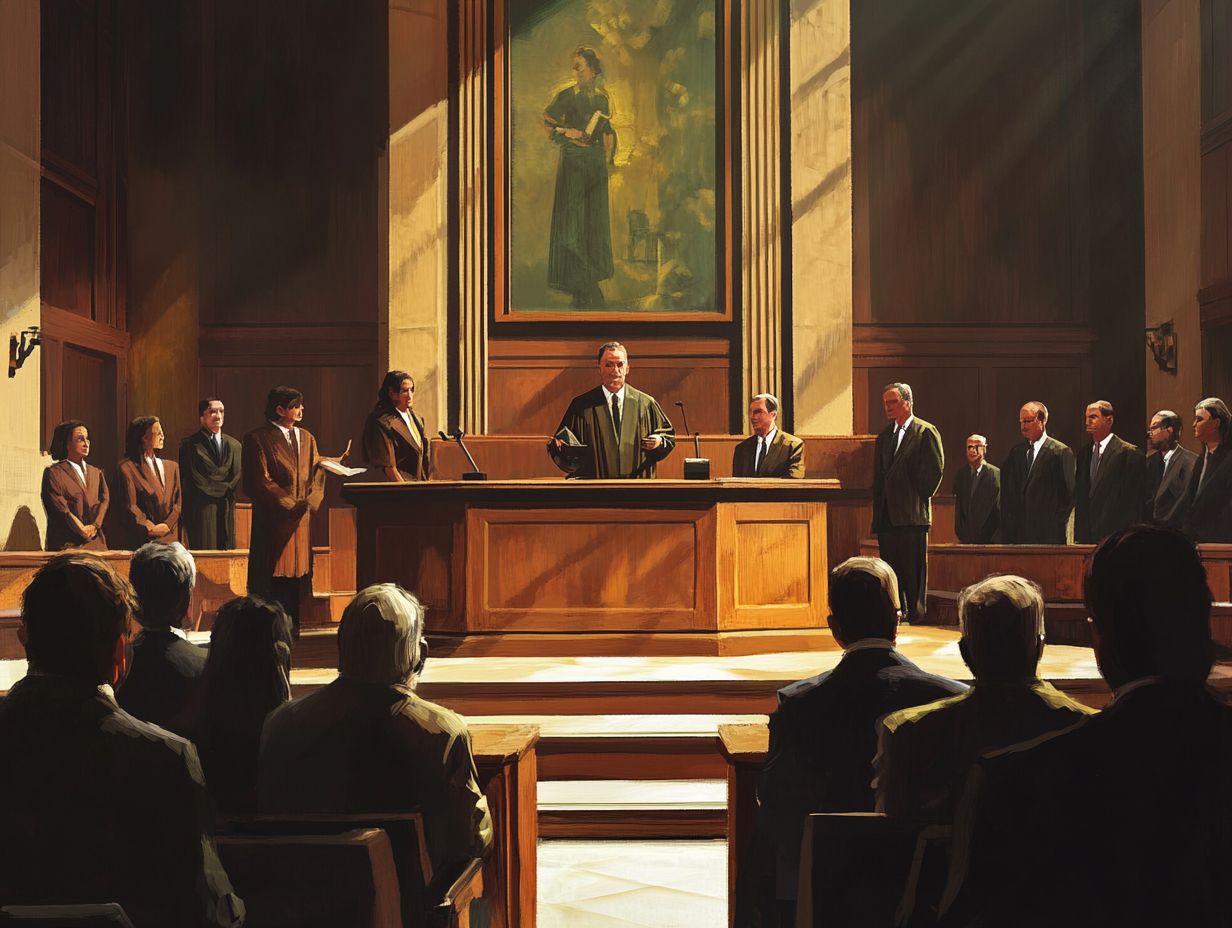
The concept of ethics is closely tied to the rights of the accused, dictating the moral standards and principles that guide their treatment in the criminal justice system. Without ethical considerations, their rights may be neglected or violated, leading to unjust outcomes.
What ethical principles are crucial in safeguarding the rights of the accused?
The most important ethical principles in protecting the rights of the accused include the presumption of innocence, the right to a fair trial, and the right to due process. These principles ensure that the accused is treated fairly and impartially throughout the criminal justice process.
How can a lack of ethics impact the rights of the accused?
A lack of ethics in the criminal justice system can seriously affect the rights of the accused. Without ethical considerations, they may be denied a fair trial, subjected to unjust treatment, or even wrongfully convicted, leading to violations of their basic human rights and severe consequences.
What is the role of legal professionals in upholding ethical standards in the rights of the accused?
Legal professionals, including lawyers, judges, and law enforcement officers, play a crucial role in upholding ethical standards regarding the rights of the accused. They are responsible for ensuring that the accused receives fair treatment and that their rights are protected throughout the criminal justice process.
How Can We All Promote Ethical Practices?
We can contribute to promoting ethical practices regarding the rights of the accused by holding accountable those who violate ethical principles, advocating for fair and just treatment, and supporting reforms to enhance the ethical standards of the criminal justice system. Additionally, understanding the role of legal counsel for the accused can educate the public about the importance of ethical considerations and help protect their rights.

